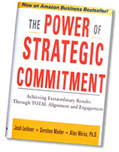
The key to keeping it alive is simple. Follow-up.
One of the questions we always get is, how do we connect our vision to our day-to-day work? They have to be linked. Whatever your vision or strategic plan or big hairy audacious goals are, they have to be embedded in your routine management practices.
When you have your meetings, you have to revisit the key issues you’re driving. Over and over again. How are we doing? What’s our current level of confidence regarding the success of this initiative? I always ask people that because what I want to know today is how convinced are you that we’re going to succeed tomorrow?
I don’t want a fluffy answer. I don’t want: Yeah! We’re going to do it! It’s not a football game. Tell me what’s really happening in your mind, because I understand that you’re 90% convinced and now I want to talk about the other 10%. That’s the only way we can have an honest conversation and address those potential shortfalls.
So it’s pretty straightforward. Aside from the banners and the posters and the fanfare, you’ve got to be checking in. You’ve got to be managing it. You’ve got to embed it into the day-to-day practices of your organization.
Don’t let the work and the vision be disconnected; they have to be one thing.
We are here to fulfill our vision. That’s why we come to work every day. Yes, I pick up my phone and I answer my voicemail because that’s all part of what needs to happen, but it also has to be aimed at fulfilling our vision. We don’t do anything else.
Otherwise, the vision is just fluff. It’s a slogan. It’s PR. It has no bearing on people’s day-to-day behavior; therefore, it’s irrelevant. That’s why so often when we go to create a vision, people roll their eyes. They know at the end of this exercise they’re going to have to go back to their “real work.”
That’s not a vision. That’s empty words on a piece of paper.


If the military taught me one good thing it’s develop a mission, assign intermediate goals that support the mission, and work like hell until you achieve them. I tell my people that despite how smart, rich or lucky people are, goals are only achieved by relentless, unswerving dedication to hard work and it’s my job to ensure that all that work in the end means something, so when I point them in a direction they have to trust I’m not doing it for the sake of hot air, I don’t waste time on things that won’t be worth it in the end.
The question is, how does one get people to buy into this line of thinking and not just go about their day to day? And how can you really know if someone isn’t just paying lipservice?
I find it hard to get that level of commitment and belief from everyone.
The bit about the 10% is key, I try to make sure my people hate failure more than they like success, because achievment gets forgotten about once it’s done, failure sticks with you. So tell me what’s not working, so we can avoid living with it forever.
I have a problem where there have been several previous management regimes that haveall had visions and strategic plans, and they have come and gone, so the workers in my office have just gotten to the point of tuning it out.
See I go about my job in this manner, and I know there is some resentment from those under me and a feeling that I’m too concerned with inconsequential minutiae.
“I don’t want t a fluffy answer” Editing bro, it works wonders.
It’s about ensuring that day to day tasks are carried out in a fashion that is consistent with the overall plan, but the downfall is are you seen as a micromanager?